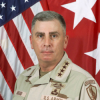John Abizaid

John Abizaid
John Philip Abizaidis a retired United States Army general and former U.S. Central Commandcommander, overseeing American military operations in a 27-country region, from the Horn of Africa, the Arabian Peninsula, to South and Central Asia, covering much of the Middle East. CENTCOM oversees 250,000 US troops. Abizaid succeeded General Tommy Franks as Commander, USCENTCOM, on July 7, 2003, and was also elevated to the rank of four-star general the same week. He was succeeded by Admiral William J. Fallon on...
NationalityAmerican
ProfessionSoldier
Date of Birth1 April 1951
CountryUnited States of America
that this is not a rush to failure. It's a rush to victory.
And the answer is it is, but it's also a difficult road to go on. There are peaks and valleys that you go through, but overall, the trend is good. We're certainly confident. And the most important thing we're confident about is that the Iraqis want to do this. They want to take the fight. They will take the fight.
Tell them we are winning, ... You don't define success as the absence of hard losses. You define it - are you defeating the enemy?
I believe, with the addition of those additional Iraqi forces, with the gelling of the Iraqi chain of command, with good leadership by Prime Minister Allawi and his ministers, that the elections will be able to be held,
I believe that there are elements of extra-legal militias that are moving around doing some of this damage. There may be people with misguided loyalties in some of the security services, although less in the army than in the police.
Militarily we are not in any danger of losing. We can't be defeated militarily based on what the enemy currently throws against us.
We need to make it very clear to the Iranians, the same way we made it clear to the Soviet Union and China, that their first use of nuclear weapons would result in the devastation of their nation.
Now, people will say, 'Well, that's a very small number,' but when you understand that they're organized in cellular structure, that they have a brutal and determined cadre, that they know how to operate covertly, they have access to a lot of money and a lot of ammunition, you'll understand how dangerous they are,
Well, the hardest thing to do, as we know from our own experience on 9/11 is protect everything all the time.
It's also natural in that part of the world to blame what people view as the... as the most important authority in the region, and that currently is the United States of America.
It makes sense that as NATO forces go in, and they're more in numbers, that we could drop some of the U.S. requirements somewhat,
It's a workable document from which good things can flow.
The people who were low-level Baathists need to know they have a part in the future of their country,
There are certainly considerations that we must make with regard to the level of the forces,